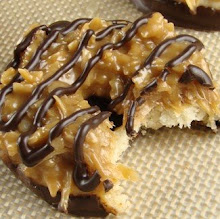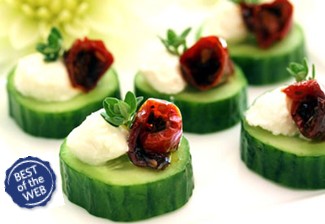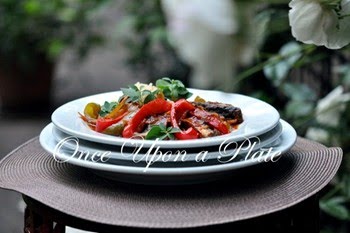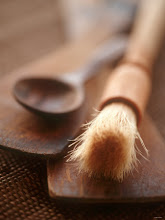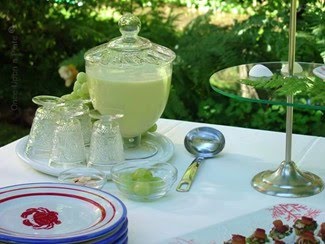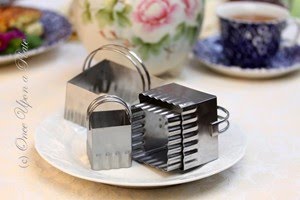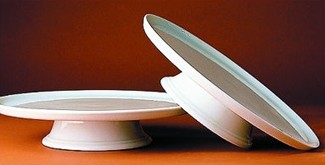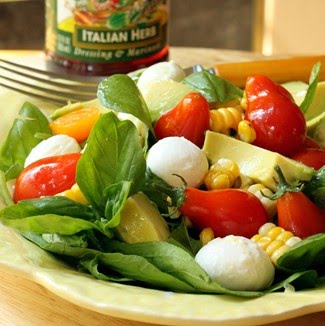
A cookbook addict, it's a habit I began nurturing in my early 20's (I'm a lot older than that now), and still the addiction continues. Many cookbooks later, I still find myself going back to some of the original ones I acquired over 30 years ago.
This favored recipe is from one of those; a plain paperbound book, with no photos, just a few pen and ink illustrations. It is the recipes within that make this one a long time favorite.
"The Book of Whole Grains" by a former "San Jose Mercury" newspaper food columnist, educator, and cook book author; Marlene Anne Baumgarner. It's been reprinted and updated since I bought mine back in 1976, but I have never found a whole wheat bread I like better than this one.
Bread baking by hand was my relaxing weekend ritual, making it every Sunday morning, through the years while our son was growing up. It's the bread he was raised on.
I enjoyed every step of making our daily bread, the smell of the butter, honey and molasses melting, the therapy of hand kneading it, waiting for the rise, shaping it into loaves, and the homey, comforting aroma of the vaguely sweet brown bread baking. It was a very satisfying experience.

I was dedicated to feeding my young family well, with wholesome foods. Being on a budget, I made as many things I could from scratch; this was one of our staples; honest, sturdy bread made from good, nutritious ingredients. Over 30 years later, this is still my favorite 100% whole wheat bread.

Though I no longer make this particular bread every week, whenever I do the sensory perceptions take me right back to those Sundays of my weekly breadbaking days.
It is wonderful for sandwiches, and makes the most outstanding toast. If you wrap it well in plastic ( a tightly sealed plastic bag works fine), and keep it in the refrigerator it will keep from one baking Sunday to the next.
I'm happy to share it with you ~
My notes: The only changes I made to the original recipe is to cut the amounts of honey & molasses as I don't care for a sweet bread on a daily basis.
At times I have add sprouted rye, wheat, etc. (about 1/2 cup of either). Also you can subsitute 2 to 3 cups of the flour with rolled oats, or a combination of rolled oats, wheat germ, bran, millet, sunflower seeds or other grains or seeds to equal the amount of whole wheat flour you subtract, to suit your taste.
If you make it, I hope you enjoy it as much as my family has through all of these years. After 30-plus years, I still declare ---It's a keeper!
100% Whole Wheat Bread
Makes 2 standard size loaves
Please see Marlene's notes at the end of the recipe.
3 cups milk or water (water brings out the flavor of the wheat best, but milk makes a more nutritious loaf.)
3 tablespoons oil or margarine (I use butter, or olive oil)
1 tablespoon salt (this seems like a lot, but the bread needs it)
1/2 cup honey (I use a scant 1/4 cup honey)
1/4 cup molasses (I use a scant 1/4 cup molasses)
2 tablespoons active dry yeast
1/4 cup lukewarm water
6-1/2 to 7 cups whole wheat flour (I use stone ground whole wheat)
Combine milk, oil, salt honey and molasses in a saucepan. Heat and stir until blended; remove from heat and cool until lukewarm. Dissolve yeast in 1/4 cup lukewarm water (if you use the cup you used to meaure the honey and molasses, the yeast will bubble faster.)
Pour liquids from saucepan into a large bowl and add yeast. You can use your sturdy stand mixer with the dough hook for mixing from this point on.
Stir in 3 cups of flour, beating well to develop gluten. Stir in remaining flour (and any other grains if you are using them) and turn out onto a well-floured board.
Knead thoroughly, until dough is smooth and elastic.
Turn into an oiled bowl, turning dough once to coat. Cover with damp cloth and allow to rise 1 hour. Punch down, form into two loaves and place into two well greased bread tins; allow to rise, covered for 45 minutes. Bake at 375-degrees (F) for 45 minutes, or until loaves sound hollow when thumped.

Marlene's notes: If, at the end of the week the loaf becomes crumbly, lightly toast the slices before serving. If bread is to be used for sandwiches, be sure not to let it over-rise, or it will have holes in it and will not contain jelly, honey (or spreads.)

And my favorite bit of Marlene's advice about this bread:
"If you start baking bread for your family, be forewarned: they may never accept store-bought, bubble-gum bread again."
I certainly found that to be true with my family. Try it toasted, with Better Butter (recipe in separate post) and you're in for a delicious and fairly healthful treat.











































